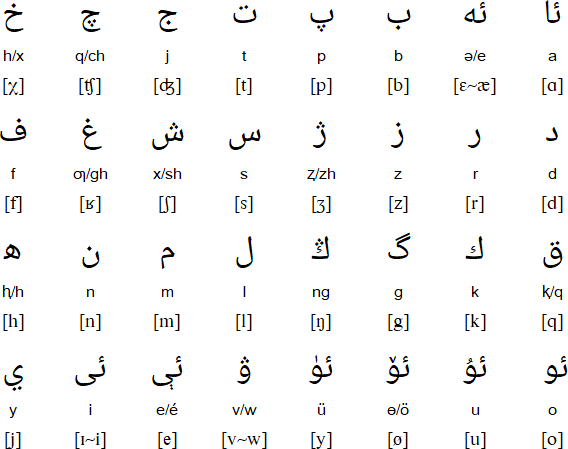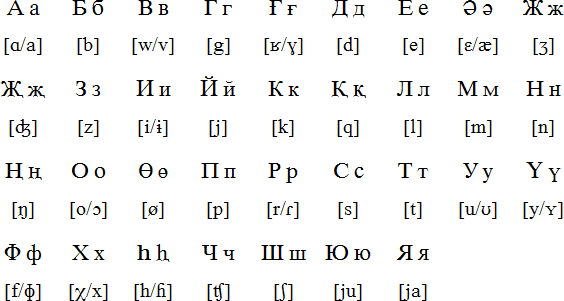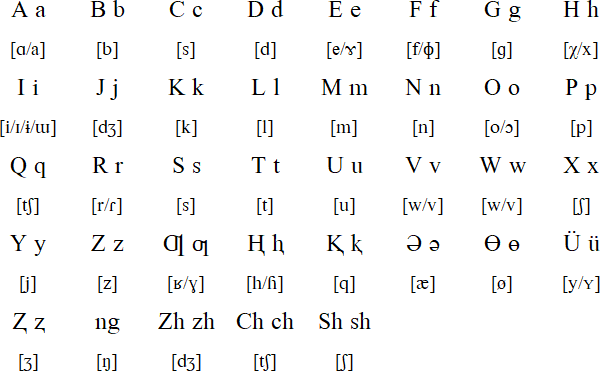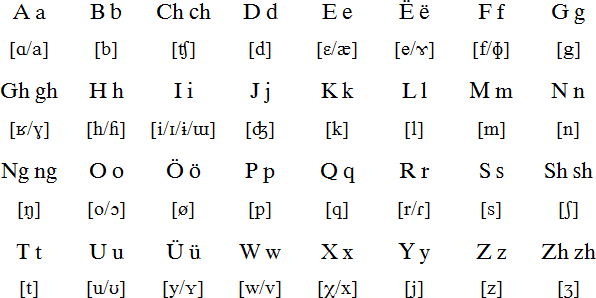Uyghur is a Turkic language with 25 million speakers (in 2016) mainly in the Xinjiang Uyghur Autonomous Region in the north west of China, where it is an official language. In Xinjiang Uyghur is used in the media, and as a lingua franca among other peoples. There are also communities of Uyghur speakers in Kazakhstan and Uzbekistan.
Uyghur was originally written with the Orkhon alphabet, a runiform script derived from or inspired by the Sogdian script, which was ultimately derived from the Aramaic script.
Between the 9th and the 18th century, Uyghur was written with an alphabet derived from Aramaic known as Old Uyghur. Uyghur was also written with the Syriac alphabet, mostly in Christian documents.
From the 16th century until the early 20th century, Uyghur was written with a version of the Arabic alphabet known as 'Chagatai'. During the 20th century a number of versions of the Latin and Cyrillic alphabets were adopted to write Uyghur in different Uyghur-speaking regions. However the Latin alphabet was unpopular and in 1987 the Arabic script was reinstated as the official script for Uyghur in China.
The name of this language is variously spelt Uigur, Uiguir, Uighuir, Uygur, Uighur, Uygur, Uyghur in English, and 维吾尔语 (Wéiwú'ěryǔ) in Mandarin Chinese. Native names of the language are written ئۇيغۇرچە / Уйғурчә / Uyghurche, or ئۇيغۇر تىلى / Уйғур тили / Uyghur tili. Uyghur is the preferred spelling in the Latin alphabet: this was confirmed at a conference of the Ethnic Languages and Script Committe of the Xinjiang Uyghur Autonomous Region held in October 2006.
The Perso-Arabic alphabet was introduced to the Uyghur people, along with Islam, in the 10th century. The version of the alphabet used to write Chagatai, now known as the Chagatay alphabet, became the literary language of the region, and was used until the 1920s. Alternative ways of writing Uyghur were devised from then. One of these, the Uyghur Ereb Yëziqi (ULY), is used mainly by Uyghurs in China and is an expansion of the Chagatay alphabet.

Source: http://en.wikipedia.org/wiki/Uyghur_Ereb_Yëziqi
Hear how to pronouce the Uyghur alphabet:
The Cyrillic alphabet for Uyghur was introduced in the Soviet Union in 1937 as a replacement for the Latin-based alphabet for Uyghur that was devised in 1926. It was one way to weaken the ties between the Uyghurs and other Turkic peoples, particularly with Turkey, where the Latin alphabet was introduced in 1927.
This alphabet is still used by Uyghurs in the Russian Federation, and in former Soviet Republics such as Kazakhstan.

http://en.wikipedia.org/wiki/Uyghur_Siril_Yëziqi
This version of the Latin alphabet, known as Uyghur Yëngi Yëziqi or Uyƣur Yəngi Yəziⱪ (UYY), was used to write Uyghur between 1965 and 1982, mainly in China.

Source: http://en.wikipedia.org/wiki/Uyghur_New_Script, with corrections by Anıl Öztürk
The Uyghur Latin Yéziq (ULY) which was finalised in July 2001 after five conferences held at Xinjiang University in Ürümqi. It was further amended in 2008. It is an auxiliary alphabet for the Uyghur language.

Source: http://en.wikipedia.org/wiki/Uyghur_Latin_alphabet
Download alphabet charts for Uyghur (Excel)

Һемме адем занидинла еркин, иззет-һөрмет ве һоқуқта бапбаравер болуп туғулған. Улар еқилге ве вийдан'ға иге һемде бир-бириге қэриндашлиқ мунасивитиге хас роһ билен билен муамил қилиши кэрек.
H̡əmmə adəm zatidinla ərkin, izzət-h̡ɵrmət wə hok̡uk̡ta babbarawər bolup tuƣulƣan. Ular ək̡ilƣə wə wijdanƣa igə h̡əmdə bir-birigə k̡erindaxlik̡ munasiwitigə hax roh bilən mu’amilə k̡ilixi kerək.
Hemme adem zatidinla erkin, izzet-hörmet we hoquqta babbarawer bolup tughulghan. Ular eqilghe we wijdan'gha ige hemde bir-birige qérindashliq munasiwitige xas roh bilen muamile qilishi kérek.
Hear a recording of this text by Adiljan Barat
All human beings are born free and equal in dignity and rights. They are endowed with reason and conscience and should act towards one another in a spirit of brotherhood.
(Article 1 of the Universal Declaration of Human Rights)
Information about Uyghur | Old Uyghur alphabet | Phrases | Numbers | Tower of Babel | Books about Uyghur on: Amazon.com and Amazon.co.uk [affilate links]
Durustal - an alternative alphabet for Uyghur
Information about Uyghur
http://www.uighurlanguage.com
http://en.wikipedia.org/wiki/Uyghur_language
http://aboutworldlanguages.com/uyghur
http://groups.yahoo.com/group/UyghurLanguage
http://www.uyghurensemble.co.uk/en-html/uy-language.html
http://www.farwestchina.com/2014/04/ultimate-guide-to-learning-uyghur-language.html
Online Uyghur lessons
http://learn101.org/uyghur.php
http://www.youtube.com/playlist?list=PLD2E76BC7C2E0DCED
http://kuscholarworks.ku.edu/dspace/handle/1808/5624
Online Uyghur phrases
http://ilanguages.org/uyghur_phrases.php
http://learn101.org/uyghur_phrases.php
http://wikitravel.org/en/Uyghur_phrasebook
Online Uyghur dictionaries
http://www.uyghurdictionary.org
http://dict.yulghun.com
http://www.uighurdictionary.com/cgi-bin/eudict_ud.pl
http://www.uyghurche.com
Free Uyghur fonts
http://www.ukij.org/fonts/
http://www.oyghan.com/
Uyghur Arabic-Cyrillic-Latin converter
http://www.yulghun.com/imla/convert.html
Online Uyghur news and radio
http://www.rfa.org/uyghur/
http://www.trt.net.tr/international/news.aspx?Dil=uy
London Uyghur Ensemble
http://www.uyghurensemble.co.uk
Altay, Äynu, Azerbaijani, Bashkir, Chagatai, Chelkan, Chulym, Chuvash, Crimean Tatar, Dolgan, Fuyu Kyrgyz, Gagauz, Ili Turki, Karachay-Balkar, Karaim, Karakalpak, Karamanli Turkish, Kazakh, Khakas, Khalaj, Khorasani Turkic, Krymchak, Kumandy, Kumyk, Kyrgyz, Lop, Nogai, Old Turkic, Qashqai, Romanian Tatar, Salar, Shor, Siberian Tatar, Soyot, Tatar, Teleut, Tofa, Turkish, Turkmen, Tuvan, Urum, Uyghur, Uzbek, Western Yugur, Yakut (Sakha)
Adamaua Fulfulde, Afrikaans, Arabic (Algerian), Arabic (Bedawi), Arabic (Chadian), Arabic (Egyptian), Arabic (Gulf), Arabic (Hassaniya), Arabic (Hejazi), Arabic (Lebanese), Arabic (Libyan), Arabic (Modern Standard), Arabic (Moroccan), Arabic (Najdi), Arabic (Sudanese), Arabic (Syrian), Arabic (Tunisian), Arwi, Äynu, Azeri, Balanta-Ganja, Balti, Baluchi, Beja, Belarusian, Bosnian, Brahui, Chagatai, Chechen, Chittagonian, Comorian, Crimean Tatar, Dargwa, Dari, Dhatki, Dogri, Domari, Gawar Bati, Gawri, Gilaki, Hausa, Hazaragi, Hindko, Indus Kohistani, Kabyle, Kalkoti, Karakalpak, Kashmiri, Kazakh, Khowar, Khorasani Turkic, Khwarezmian, Konkani, Kumzari, Kurdish, Kyrgyz, Lezgi, Lop, Luri, Maguindanao, Malay, Malay (Terengganu), Mandinka, Marwari, Mazandarani, Mogholi, Morisco, Mozarabic, Munji, Noakhailla, Nubi, Ormuri, Palula, Parkari Koli, Pashto, Persian/Farsi, Punjabi, Qashqai, Rajasthani, Rohingya, Salar, Saraiki, Sawi, Serer, Shabaki, Shina, Shughni, Sindhi, Somali, Soninke, Tatar, Tausūg, Tawallammat Tamajaq, Tayart Tamajeq, Ternate, Torwali, Turkish, Urdu, Uyghur, Uzbek, Wakhi, Wanetsi, Wolof, Xiao'erjing, Yidgha
Abaza, Abkhaz, Adyghe, Aghul, Akhvakh, Akkala Sámi, Aleut, Altay, Alyutor, Andi, Archi, Assyrian / Neo-Assyrian, Avar, Azeri, Bagvalal, Balkar, Bashkir, Belarusian, Bezhta, Bosnian, Botlikh, Budukh, Bulgarian, Buryat, Chamalal, Chechen, Chelkan, Chukchi, Chulym, Chuvash, Crimean Tatar, Dargwa, Daur, Dolgan, Dungan, Enets, Erzya, Even, Evenki, Gagauz, Godoberi, Hinukh, Hunzib, Ingush, Interslavic, Itelmen, Juhuri, Kabardian, Kaitag, Kalderash Romani, Kalmyk, Karaim, Karakalpak, Karata, Karelian, Kazakh, Ket, Khakas, Khanty, Khinalug, Khorasani Turkic, Khwarshi, Kildin Sámi, Kili, Komi, Koryak, Krymchak, Kryts, Kubachi, Kumandy, Kumyk, Kurdish, Kyrgyz, Lak, Lezgi, Lingua Franca Nova, Lithuanian, Ludic, Macedonian, Mansi, Mari, Moksha, Moldovan, Mongolian, Montenegrin, Nanai, Negidal, Nenets, Nganasan, Nivkh, Nogai, Old Church Slavonic, Oroch, Orok, Ossetian, Pontic Greek, Romanian, Rushani, Russian, Rusyn, Rutul, Selkup, Serbian, Shor, Shughni, Siberian Tatar, Sirenik, Slovio, Soyot, Tabassaran, Tajik, Talysh, Tat, Tatar, Teleut, Ter Sámi, Tindi, Tofa, Tsakhur, Tsez, Turkmen, Tuvan, Ubykh, Udege, Udi, Udmurt, Ukrainian, Ulch, Urum, Uyghur, Uzbek, Veps, Votic, Wakhi, West Polesian, Xibe, Yaghnobi, Yakut, Yazghulami, Yukaghir (Northern / Tundra), Yukaghir (Southern / Kolyma), Yupik (Central Siberian)
Languages written with the Latin alphabet
A-chik Tokbirim, Adinkra, ADLaM, Armenian, Avestan, Avoiuli, Bactrian, Bassa (Vah), Beitha Kukju, Beria (Zaghawa), Borama / Gadabuursi, Carian, Carpathian Basin Rovas, Chinuk pipa, Chisoi, Coorgi-Cox, Coptic, Cyrillic, Dalecarlian runes, Elbasan, Etruscan, Faliscan, Fox, Galik, Georgian (Asomtavruli), Georgian (Nuskhuri), Georgian (Mkhedruli), Glagolitic, Global Alphabet, Gothic, Greek, Hurûf-ı munfasıla, Irish (Uncial), Kaddare, Kayah Li, Khatt-i-Badí’, Khazarian Rovas, Koch, Korean, Latin, Lepontic, Luo Lakeside Script, Lycian, Lydian, Manchu, Mandaic, Mandombe, Marsiliana, Medefaidrin, Messapic, Mongolian, Mro, Mundari Bani, Nag Chiki, Naasioi Otomaung, N'Ko, North Picene, Novo Tupi, Nyiakeng Puachue Hmong, Odùduwà, Ogham, Old Church Slavonic, Oirat Clear Script, Ol Chiki (Ol Cemet' / Santali), Old Italic, Old Nubian, Old Permic, Ol Onal, Orkhon, Osage, Oscan, Osmanya (Somali), Pau Cin Hau, Phrygian, Pollard script, Runic, Székely-Hungarian Rovás (Hungarian Runes), South Picene, Sutton SignWriting, Sunuwar, Tai Viet, Tangsa, Todhri, Toto, Umbrian, (Old) Uyghur, Wancho, Yezidi, Zoulai
Page last modified: 14.04.24
[top]
You can support this site by Buying Me A Coffee, and if you like what you see on this page, you can use the buttons below to share it with people you know.

If you like this site and find it useful, you can support it by making a donation via PayPal or Patreon, or by contributing in other ways. Omniglot is how I make my living.
Note: all links on this site to Amazon.com, Amazon.co.uk
and Amazon.fr
are affiliate links. This means I earn a commission if you click on any of them and buy something. So by clicking on these links you can help to support this site.
[top]